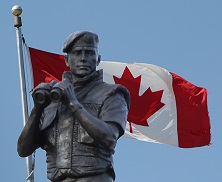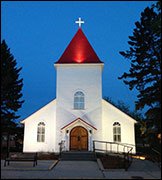True and Fascinating Canadian History
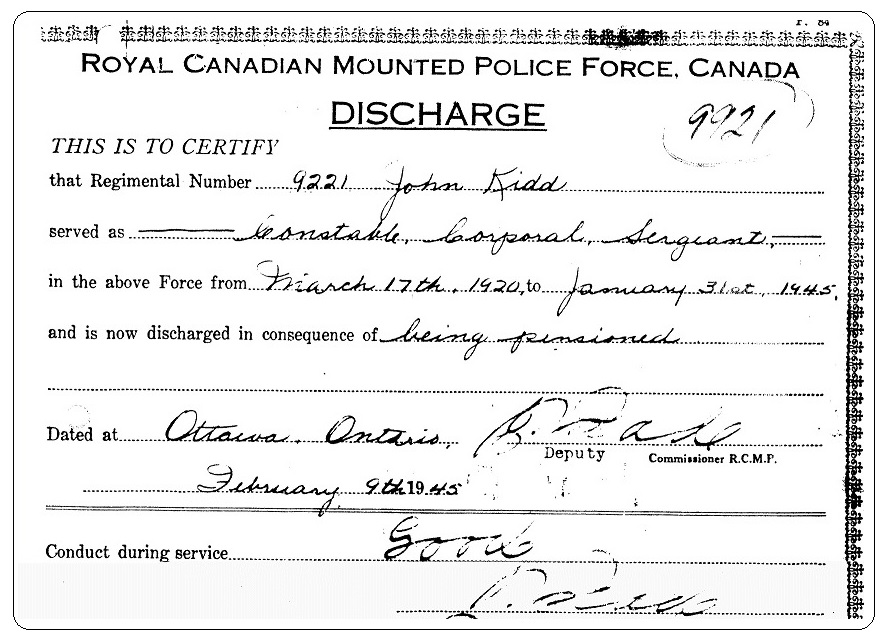
Vet of the Month: January 2011
Reg.#9221, Sergeant John Kidd
RCMP Vets. Ottawa, ON
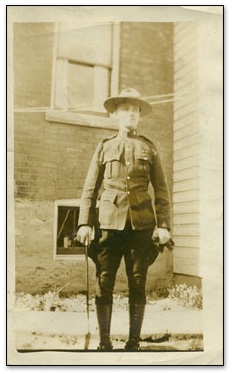
The study of Shakespeare causes one to feel the full range of life's emotions; ambition, love, aggression, grief, fear, hate and loneliness. There are others. Most often, emotions are intermingled -- one cannot distinguish where one emotion ends and another begins.
The life and times of our Vet of the Month for January, 2011 is of particular importance because his experiencesallow us to look back and imagine his emotions -- especially during hard times when he served in the Force.
Our Vet's name was Reg.# 9221, John Kidd. His life had just begun during the early twentieth century.
I imagine that John Kidd must have been sad and lonely. He had left his home in Scotland as a very young boy and immigrated to Canada with his mother and his siblings. Surely, as a boy, he felt alone because he was at an impressionable age and he had left his chums.
As a little boy, he must have been thinking; who will I know, where will I go, what about my family and friends whom I have left, will I ever return to my home in Scotland, will I survive a new life in Canada? It is natural, I think, for anyone like John to experience and sense such feelings of isolation. Reluctance, maybe fear as well.
Anxiety is another emotion John Kidd must have felt. What are the consequences of our family landing in Canada? Where will we live or where will we go to school? Eventually, he must have thought about job possibilities? He must have felt tremendous uncertain because in a few short years he would be a teenager and he's be expected to carry more of the load.
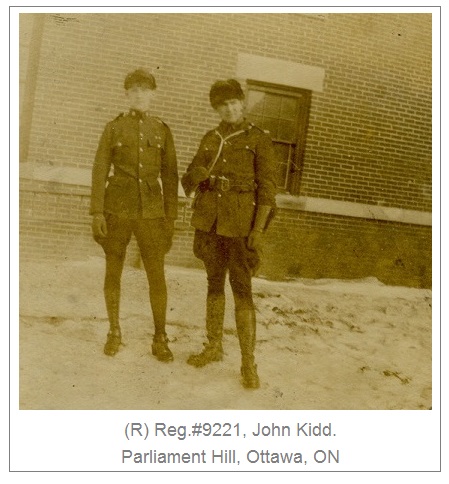
He was facing the turbulent times of World War I. And his hopes and dreams? He must have been strengthened by hope for he eventually fell in love with Viola and they married. Then came their new family. All in all, the life of John Kidd represents the kind of life not unlike the lives of thousands and thousands of new Canadians. To them we must be grateful and we remember John Kidd and salute him!
Yes, Sgt. John Kidd of the Royal North West Mounted Police (RNWMP) is our Vet of the Month. Sgt. Kidd's granddaughter, Marlene O'Neil of Ottawa contributed the material and photos for this memorable story and I am very grateful for her interest and help. Granddaughter O'Neil also responded to additional interview questions -- the questions and her responses are also included in this story.
The photo left is of Sgt. Kidd. It was taken in Ottawa near the Parliament Buildings in the late 1950's. Other photos from the same series, lead Marlene O'Neil to believe her grandfather was attending a funeral at the time because there are a few photos of a horse being led rider less with boots pointed backward. Perhaps we will discover that it was a funeral procession for a parliamentarian or a dignitary?
The life of John Kidd is truly worth recalling also because his life presents many lessons to us. His life may remind us of our own parents who were born at the same time as he. They all faced the same struggles -- all faced the same daily difficulties and worries. John Kidd and his wife, like many others, had to care for their family -- in John Kidd's case, did I mention he and his wife had thirteen children? Responsibility? Yes, lots!
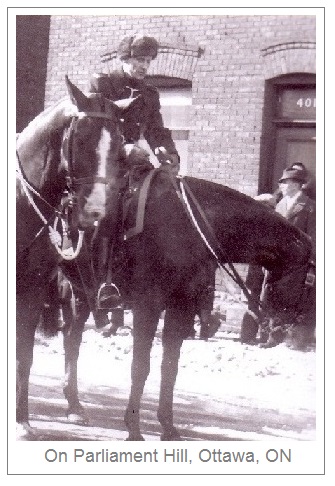
In those days, large families were not uncommon and there was enough work at home to go around. Everyone was required to pitch in. John Kidd engaged into the RNWMP and he volunteered to enlist in WWI. He went overseas also so he well deserves to be chosen for Vet of the Month? He was a very special new Canadian.
John Kidd's devotion and love of family come to mind. When we speak of John Kidd we are reminded of the strength and endurance which men and women of the early and mid twentieth century must have had to withstand life. Sacrifice filled the day. Hard work. Jobs were few. Rewards were fewer. Hard, boring physical labour was a great part of a daily job during these times.
Days were long due to the lack of tools or inventions which are available to us today. His family had to be sustained. Winters during the mid twentieth century were fierce and the cold was intense. People of the time had little but for their family and whatever jobs they could find.
John Kidd was born on September 23, 1901 in Dalziel Parish, County of Lanark, Motherwell, Scotland. After immigrating to Canada, he enlisted in World War I. It was September 7, 1916.
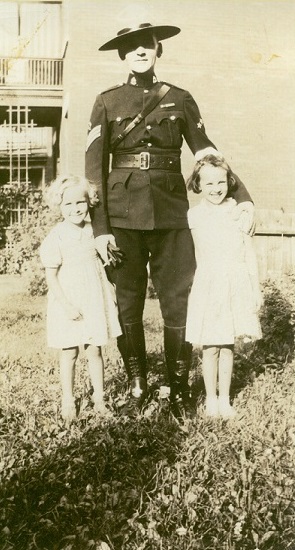
He was partly successful in his plan; he was sent overseas, but a little over a year later, he was discovered to be underage and he was discharged on October 10, 1917. The theme of his actions to volunteer in war is called devotion -- devotion to safeguard his new home Canada.
John Kidd joined the Force on March 17, 1920. The after effects of World War I were at their height. It was a terribly sad time in Canada. Families were broken. Thousands lost their lives. Loved ones who died were not returned to Canada for burial. In the mind's of many, even today, recollections remain vivid in the lives of decedents such as the family of John Kidd.
Sgt. Kidd's Service File shows his devotion to Canada and the Force. He received regular promotions from Constable to Corporal and on to Sergeant. His postings with the RCMP involved moves to 'Depot' Div. in Regina, Saskatchewan, 'D' Div. or Manitoba and back to 'N' Div. and 'HQ' in Ottawa, ON.
He married Viola Gardiner from Cantley, QC. John and Viola had 13 children. He and his family first lived in South March, Ontario and later they moved into Ottawa.
Sgt. Kidd retired from the Force on January 31, 1945. He died at home from a heart attack in 1963. He is buried in Pinecrest Cemetery, Ottawa, Ontario.
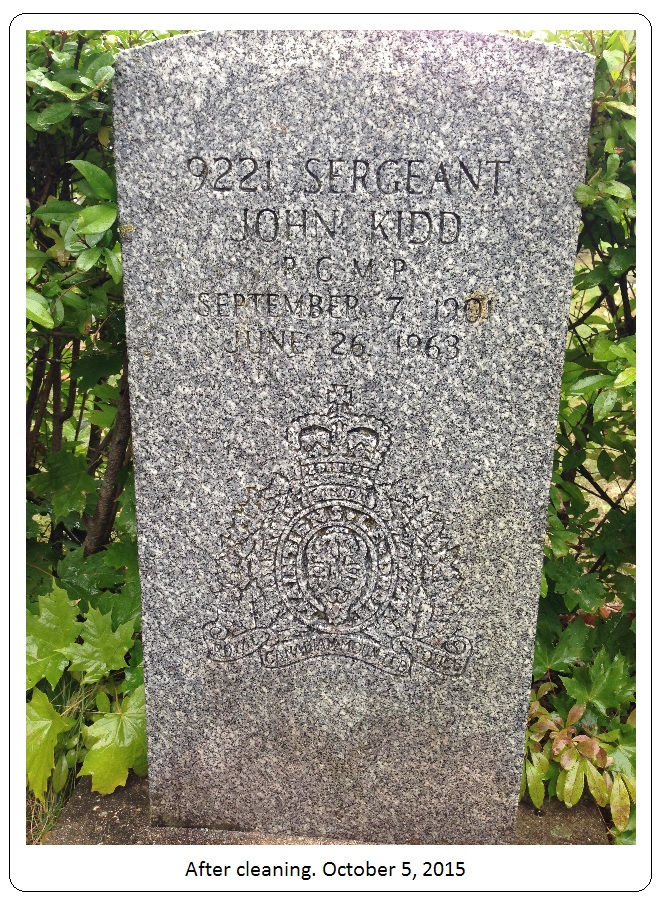
Hi Joe;
I will first attempt to answer your questions, then come back to the Sgt. Kidd Vet story since I have had consults with my Mom and Mom's sister -- both are thrilled that this material will be posted. I also called one sister who lives locally and I called another in the States (ha, she's the oldest).
Question: As a boy, where did John Kidd land upon arrival to Canada?
We estimate that John Kidd, male, age 8 years was born about 1902. His Date of Arrival was August 13, 1910 on board the Vessel 'Hesperian'. A search of the Hesperian's database says its Port of Arrival was Montreal, QC and its Port of Departure was Glasgow, Scotland. Roll Number: T-4770
John's father, David, travelled to Canada earlier and he had secured employment as an Engineer with the Toronto Dairy. He lived at 38 Silver Street, Toronto, ON. David's wife, Isabella, travelled from Motherwell to Glasgow, Scotland and then on to Montreal via the 'Hesperian' and then by rail, we think, to Toronto. She travelled with children Catherine, John (then 8 years old), Alexander, David, Mary, Elwood and infant Catherine. (Can you imagine all those kids including a newborn baby voyaging to another country)? Impossible!
Question: Where did John Kidd meet his wife, your grandmother?
John's wife, Viola, worked at the Canadian Banknote Co. on Wellington St. in Ottawa. She was born in Cantley, QC, and at one time John was also working in her local area. John and Viola met in Cantley as recalled by my daughter Mavis.
Question: Any idea what John Kidd did between WWI and the time he joined the Force?
I have updated some information and I refer to his chronology as this is easiest to see life events – briefly, John Kidd worked at a printing company and was referenced in his War Attestation papers as a clerk. As a boy, he had been well educated in Scotland.
Question: Did John join the RNWMP or the RCMP?
John joined the RNWMP per his initial application which I have on file. It appears that he was first stationed in Regina and then it seems he was transferred to Ottawa due to various health issues.
Question: How did John and his Viola handle their big family and their work?
The family struggled to make ends meet with 13 children. They moved frequently as a result of a growing family in numbers and considering the economy of the time. John and Viola's first three sons; Kenny, Eddie, and Arnold all fought in WWII overseas. Viola being from a farm knew how to make the dollar and the food stretch and she ruled the roost when it came to instructing their children.
Marjie recalls John Kidd's horse which he rode. One day, while he was working, the horse stepped on his toe. He suffered for years as a result of his foot injury caused by the horse. His sisters recall John bringing old horses home from the RCMP stables – he figured it was better to rescue them rather than sending them to the glue factory. Sylvie, a daughter, recalls John bringing a horse to their home in the city as there had been a fire at the stables so he gave the poor animal a temporary place. Marjie a daughter also remembers that John made the best potato soup in the country.
John would take his daughter Marjie and Marylyn sometimes by streetcar to the Parliament buildings where he worked as a Commissionaire. He allowed them to play pool. He was most often without a vehicle so he was forced to walk most places or take streetcars.
Question: Did John Kidd have any interests, hobbies?
John was gifted with music and he played the piano by ear. He could sing as well. He was often gone nights playing at the Officer's Mess and other community events to add to the family income. He was called 'Johnny Boy' when he was playing and singing. His sisters also recall he would play and lead the song 'Tramp, Tramp, Tramp' to hear the feet of marching men sometimes on Sunday and they would all march around around the house...and he would go through the same music numerous times naming each one of the children in the song.
His daughter Sylvie fondly recalled that he loved opera music and he would play it loudly at home. Each move brought about repairs as they could only afford fixer-upper rentals due to his meagre salary and so many children added to war times. Marjie recalls helping him as he would putty the cracks, make repairs and paint – a bit of a handyman when the need arose. The Kidd family always had a small garden tended by John's wife Viola.
Question: Who died first...he or his wife? Are they buried together?
John died in 1963. At the time, John's son-in-law Jack O'Neil was enroute for his work at the fire station. Jack saw a commotion at the end of the street, but thought nothing of it. He learned later in the day that it was John, his father-in-law John Kidd who had suffered a heart attack. John died at home. Mavis, John's daughter recalls he kept a sock in his top drawer and it's where he kept money needed for his funeral. He showed the location of the money to Mavis a few times so someone would know where it was in his last years.
His wife, Viola continued to live at the home and then moved in with her youngest daughter and son (Sylvia and Greg) after John passed on. John was buried in Pinecrest Cemetery with an RCMP stone. His son David known as Irving (1927-1957) is also buried at this grave. David died June 10,1957.
There is no reference on the stone as per RCMP policy but they permitted David's ashes to be buried with his father and at the foot of his fathers grave.
Viola (nee Gardiner, John Kidd's wife) was of Scottish descent as well, she was born in Cantley, QC. She was the focus in the Ottawa Citizen Weekender story in the 1970's about women who clean the interior of the Parliament offices. As a cleaning lady, Viola would complain about various politicians using the House of Commons Room and who would stick gum under the wooden trays and chairs.
Unfortunately, John took his pension on retirement and there was no widow pension. After John's death, Viola had to fend for herself for income. Viola is buried in Cantley, QC in the Old Protestant Cemetery because she purchased a plot years ago to be near her parents. Viola spent her last few years in Ottawa's Old Orchard Nursing Home and died at the age of 101 years. It was June 1, 2001.
Question: Did John Kidd ever mention any of his work projects, cases, unusual things?
John's sisters told me that he did not speak about his work, family or WWI. He spent a great deal of time with the Mounted Police and on Parliament Hill. We believe his health was compromised when he fought as a young boy in WWI as he was exposed to gas and the fierce weather elements. Consequently, his police career was interrupted and he was given lighter duties. His excellent writing and numbering skills often helped him with desk work.
John was in WWI and he reenlisted after his first honourable discharge for being underage. He served overseas (still looking for his war file) and was found out when he suffered a shrapnel injury. He enlisted in September 1916 have just turned 15 (fudged his birth date on the attestation). He was sent home at the age of 16 after a year of service on the line and travelled from Liverpool to Halifax and then landed in Quebec on Aug 27 1917 – we was discharged in October. He reenlisted again on January 20, 1919 and was demobilized in July 1919.
In summary, the history of our ancestors is so very important as it gives us time to reflect on a life in different times, to remember the good time and the bad, and provides us with a better understanding of who we are today, and how we got here. To remember our lives is to reflect that we were never alone. To pass along the beginning is to ensure we do not forget that pain, sacrifice and the joy with all the in-betweens. The foundation of family be it blood or service, is there if you choose to recall, to build from and strengthen.
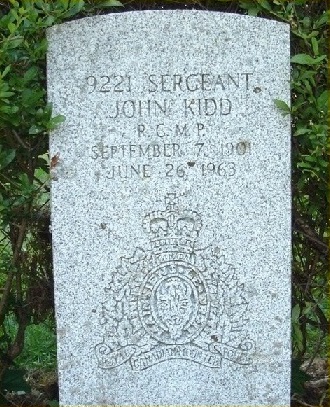
The pride of the accomplishments past should always be with us. That is what makes us all family now and builds our strength with generations forward.
*Mavis (my mom) advised that the best man for John her dad was also an RCMP officer – per the wedding certificate -- his name was Alex(or Alexis) Gagnon – both he and John were living at 140 Argyle St. Ottawa at the time of John's marriage.
Joe, I have also traced the photo of my grandfather John Kidd on his horse on Parliament Hill. My research leads me to believe the photo was taken at the State Funeral of Sir Robert Borden who died June 10, 1937. The rider less horse was only used for Governors General or for important parliamentarians. The RCMP led the honours.
In this brief story of John Kidd's life, his granddaughter and her family have collaborated with me in an attempt to illustrate the devotion which Sgt. John Kidd made to his family, to Canada and to the Force. We have much reason to express our gratitude to families such as the Kidd's especially because of their life's trials. My thanks to Marlene O'Neil for her support, cooperation, stories and photos.
As I read and learned more about John Kidd's life, I reflected on the man and his dignity. Dignity was an essential part of John Kidd's personality.
I would liked to have met him.
Reporting from Fort Healy,
J. J. Healy
January 23, 2011
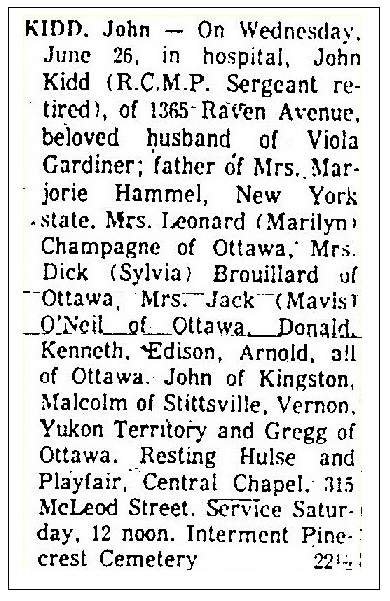
Note: I am pleased to add the following note from S/Sgt. Peter Kidd which I received after the Vet of the Month story was published.
Hi Joe,
I am presently a member of the Force in my 25th year of service. About a year ago I began to gather documents relating to my grandfather Sgt. John Kidd (Vet of the Month) of Ottawa who I never knew. He passed away when I was less than two years old. I obtained copies of his Attestation Papers relating to his days with the CEF Battalion 204 "Beavers".
I also obtained a copy of his Medical File from the RCMP which contained a lot of interesting information relating to his respiratory problems after returning from the War. There's even a reference to an injury he suffered while working at a printing press prior to joining the Force.
Two days ago, I discovered that you had written a story about him as Vet of the Month: January 2011.
My father John is mentioned in the copy of Sgt. Kidd's obituary as "John of Kingston." My father also died when I was young and so I did not get the opportunity to come to know many of my relatives on my father's side. Your article provided me with a lot of unknown information. Thank you very much.
I would like to contact the main contributor to your article Ms. Marlene O'Neil of Ottawa. I believe she is my cousin. I am in Ottawa occasionally as my son attends University there. Ironically, two weeks ago I drove past the Pinecrest Cemetery on Baseline Road unaware that Sgt. Kidd's grave is there.
I am hoping that you would forward this email to Ms. O'Neil or provide a contact number for her (with her permission). I would love to talk to her.
Thank you,
Sincerely,
S/Sgt. Peter Kidd
Reg.# 39566
Hi Peter; thanks for your very kind note...sometimes it seems that this web volunteer work is all about bringing families together. I am glad it worked for you.

